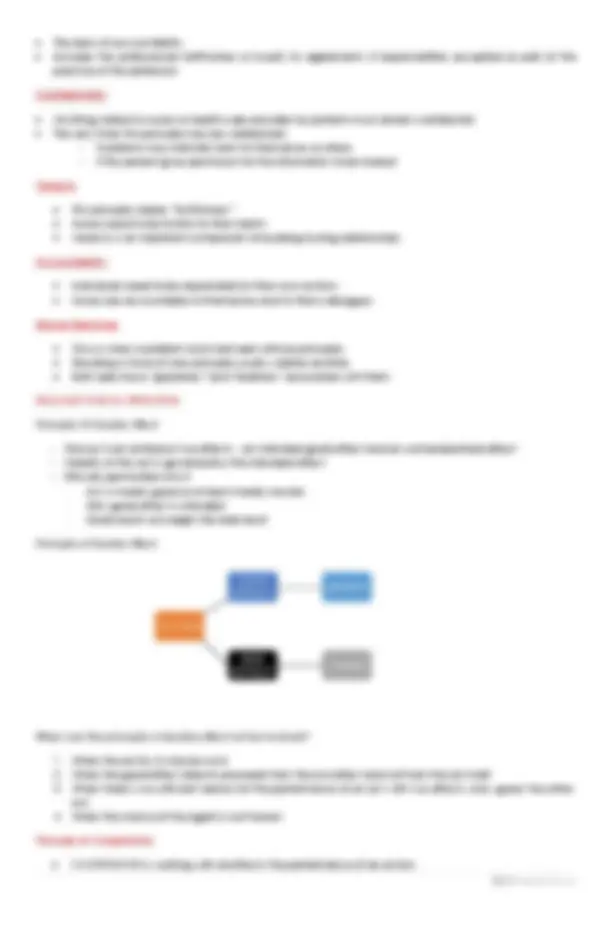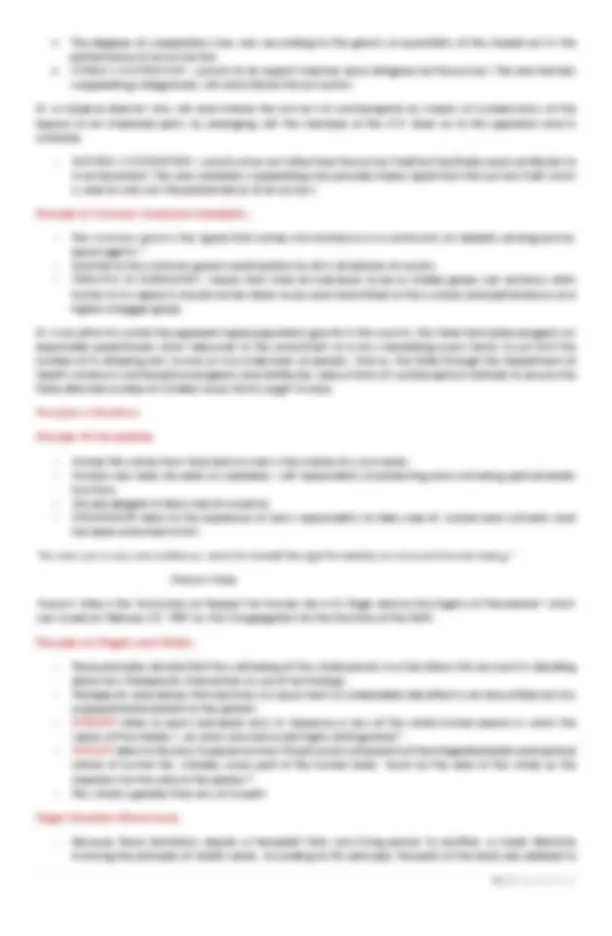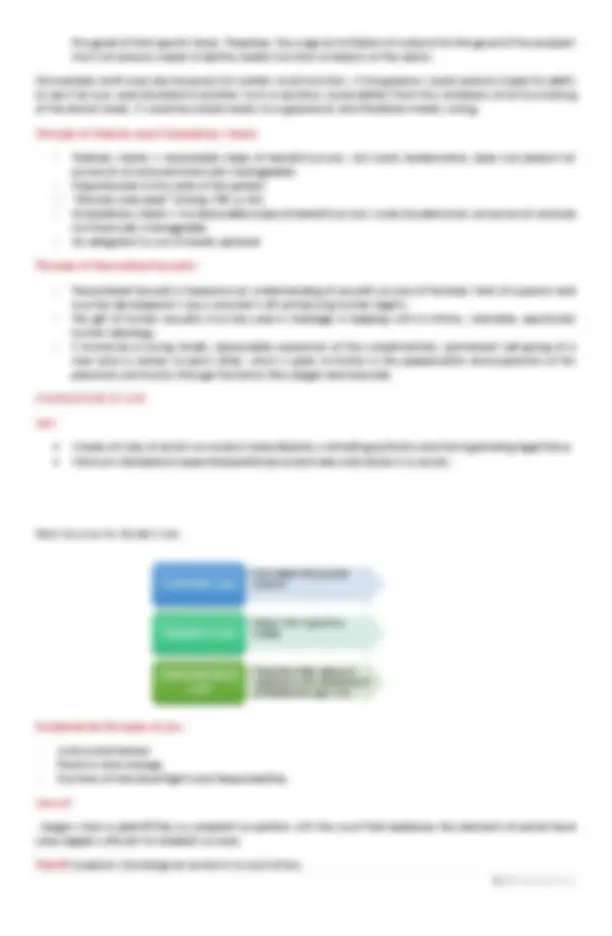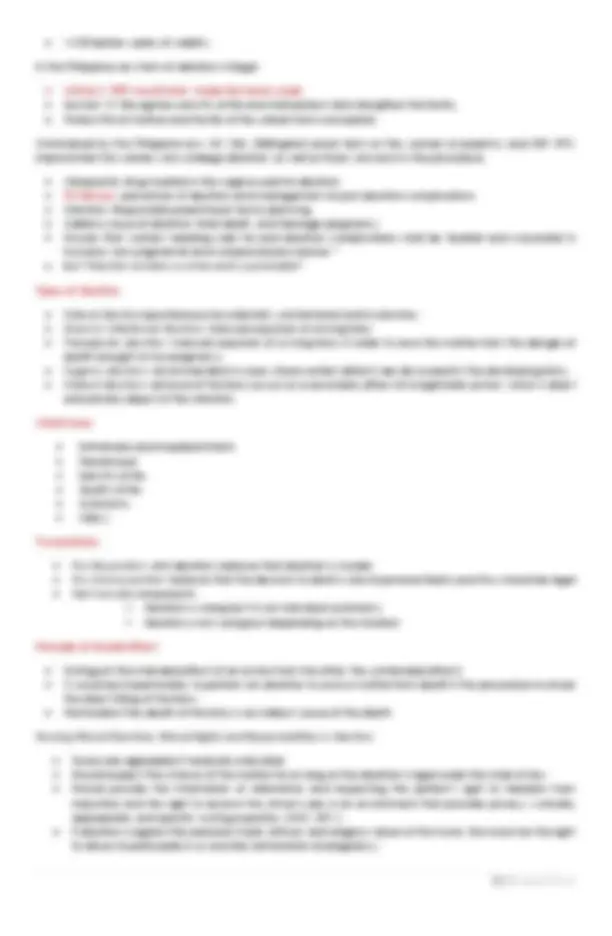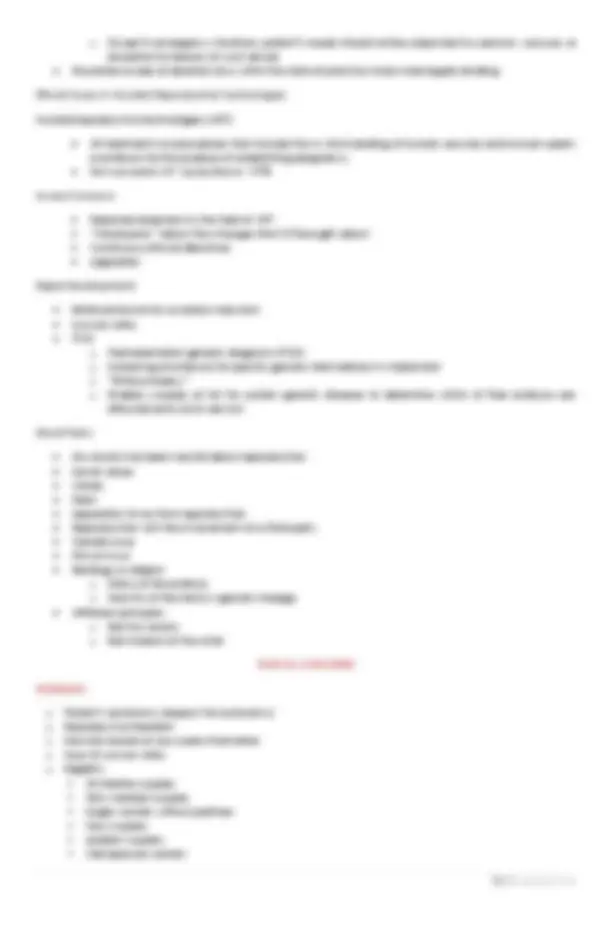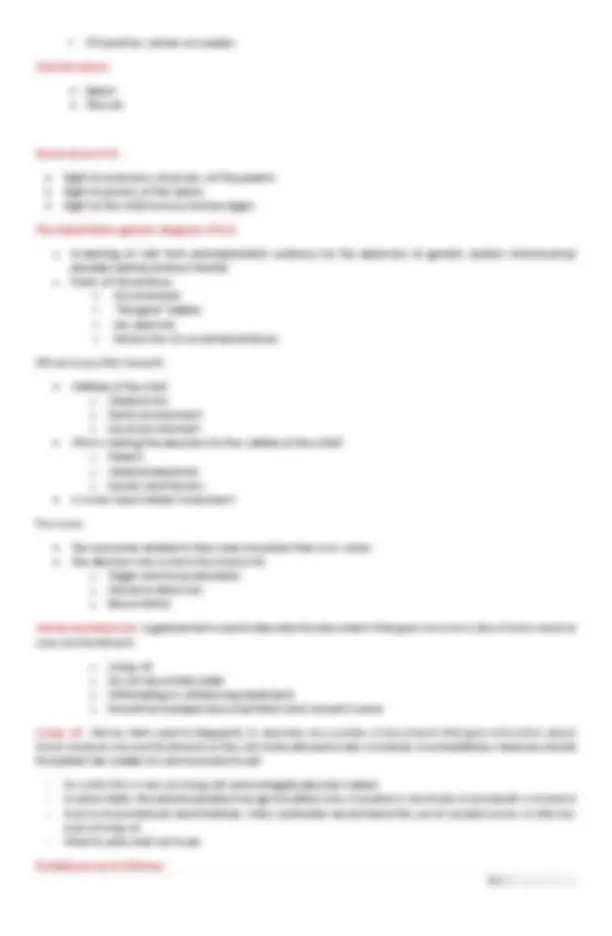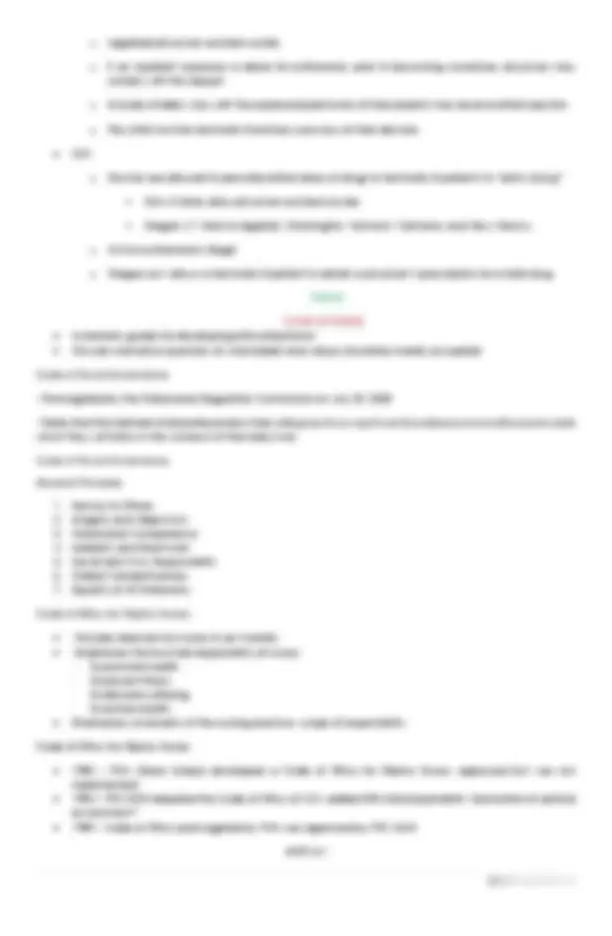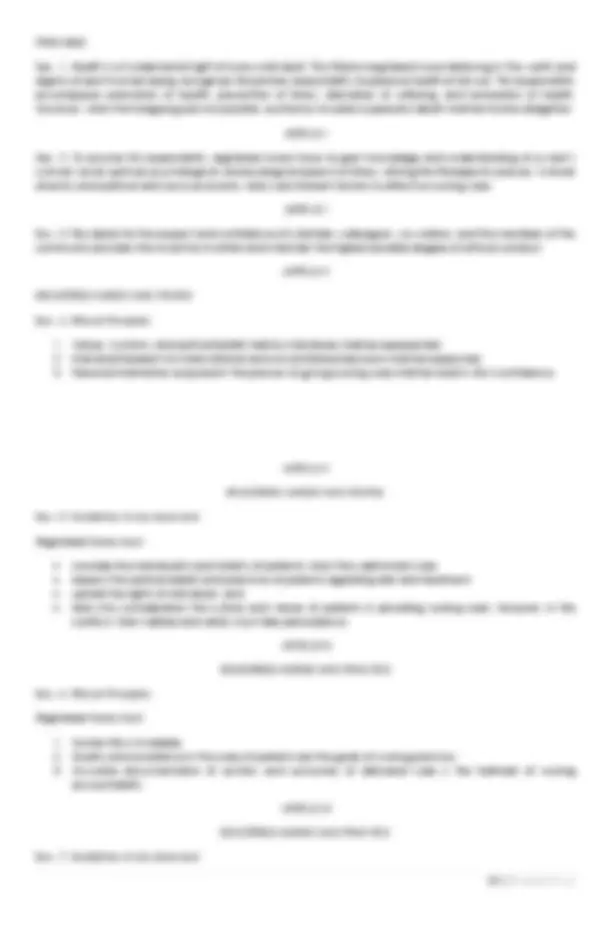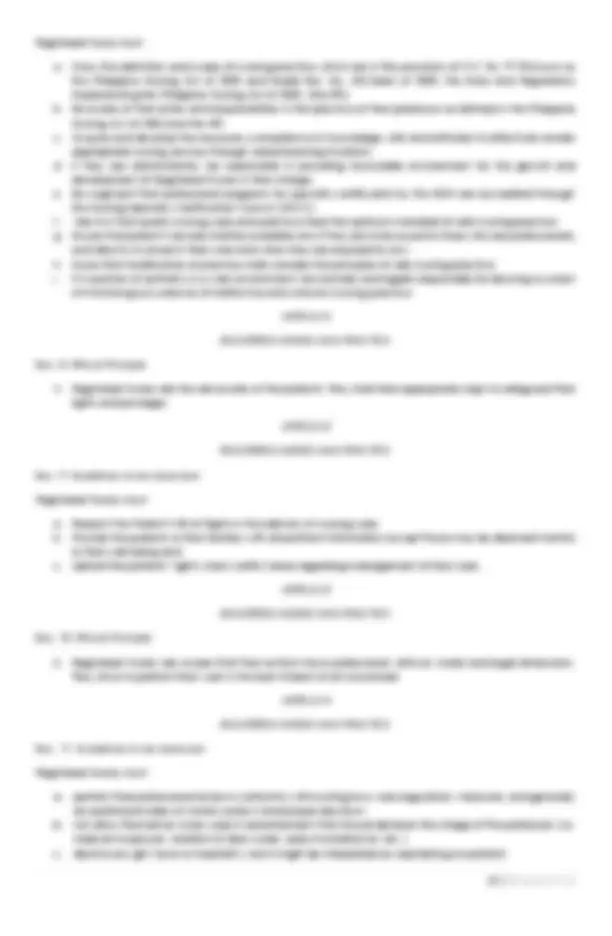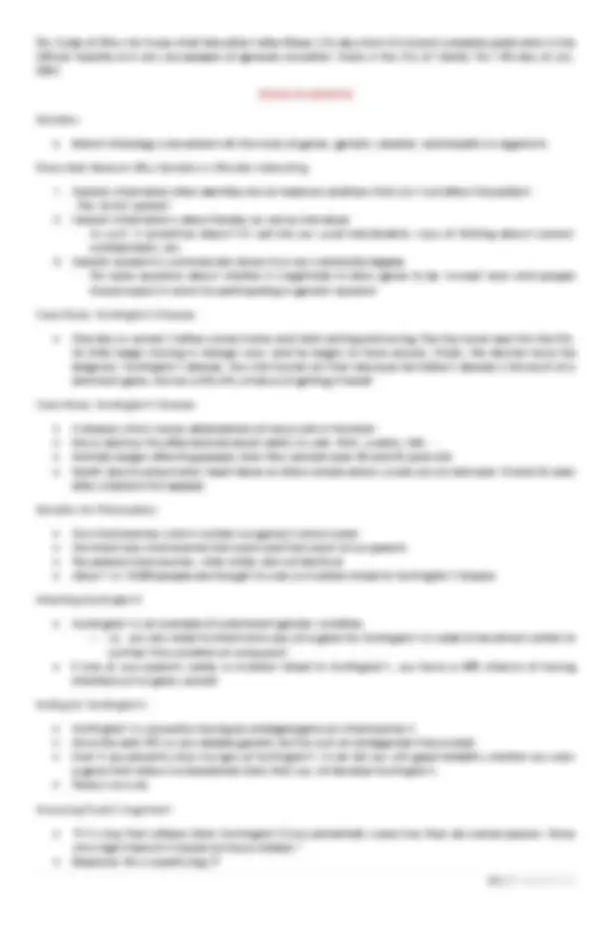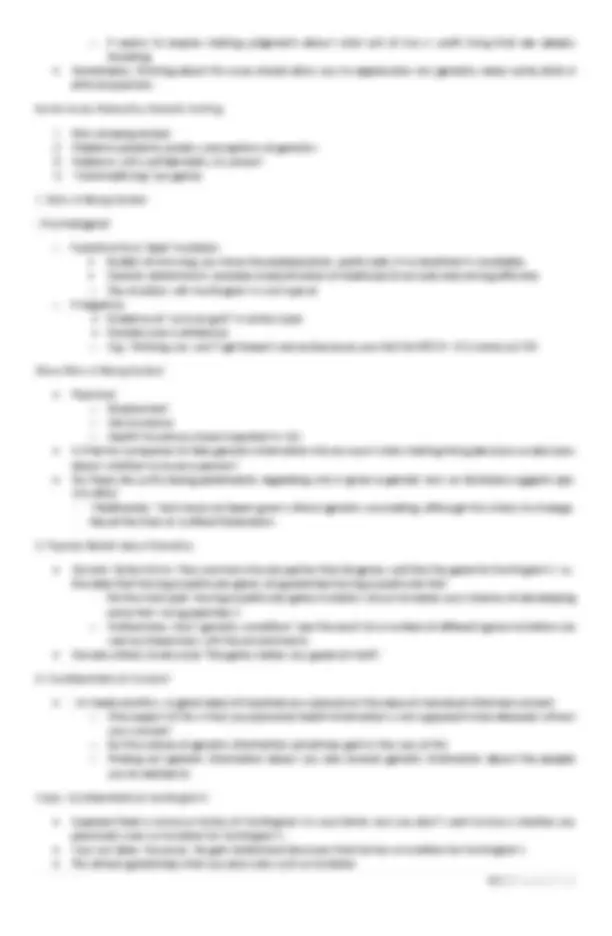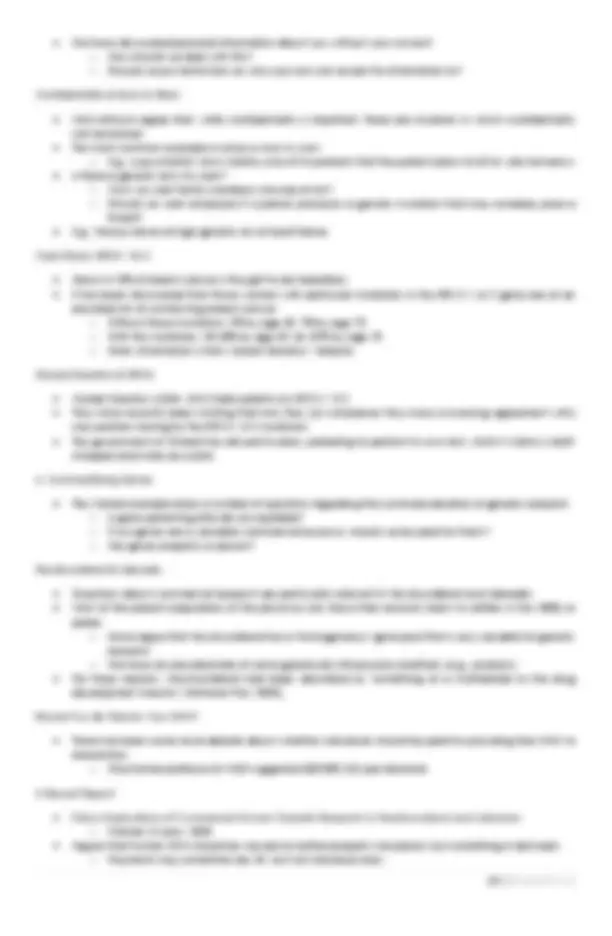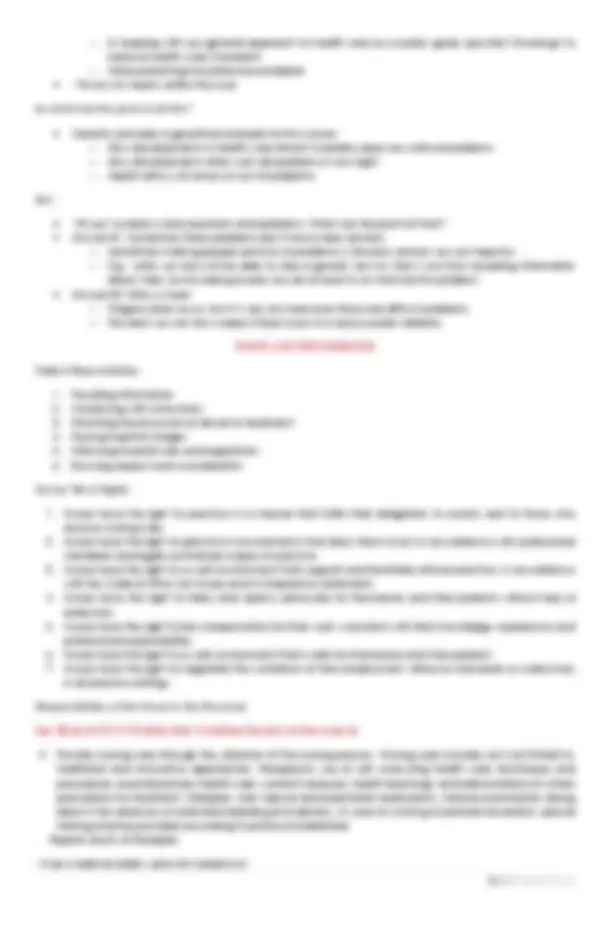Download Bioethics study notes 2022 and more Study notes Bioethics in PDF only on Docsity!
Bioethics
PRELIMS
THEORIES AND PRINCIPLES OF HEALTH CARE ETHICS
- Ethics is the moral principles that govern a person’s behaviour or the conducting of an activity.
- Morals are concerned with the principles of right and wrong behaviour and the goodness or badness of human character. Ethical Issues in Nursing Theories of Ethics
- Utilitarianism (Consequentalism)
- Act-utilitarianism
- Rule-utilitarianism
- Deontlogy Utilitarianism
- Right action is that which has greatest utility or usefulness
- No action is, in itself, either good or bad
- The only factors that make actions good or bad are the outcomes Act-Utilitarianism
- A person performs the acts that benefit the most people, regardless of personal feelings or the societal constraints such as laws. Rule-Utilitarianism
- Seeks to benefit the most people but through the fairest and most just means available. It takes into account the law and is concerned with fairness. Deontology (Kantianism)
- The rightness or wrongness of an act depends upon the nature of the act, rather than its consequences.
- People should adhere to their obligations and duties when engaged in decision making when ethics are in play
- A person who adheres to deontological theory will produce very consistent decisions since they will be based on the individual’s set duties Virtue Ethics
- Judges a person by his/her character rather than by an action that may deviate from his/her normal behaviour
- One weakness of virtue ethical theory is that it does not take into consideration a person’s change in moral character. ETHICAL PRINCIPLES
- AUTONOMY
- NONMALEFICENCE
- BENEFICENCE
- JUSTICE
- FIDELITY
- CONFIDENTIALITY
- VERACITY
- ACCOUNTABILITY Autonomy
- The freedom to make decisions about oneself
- The right to self-determination
- Healthcare providers need to respect patients’ rights to make choices about healthcare, even if the healthcare providers do not agree with the patient’s decision. INFORMED CONSENT relates to a process by which patients are informed of the possible outcomes, althernatives, and risks of treatments, and are required to give their consent freely. It assures the legal protection of a patient’s right to personal autonomy in regard to specific treatment and procedures. Patients are given the opportunity to autonomously choose a course of action in regard to plans of medical care. NONCOMPLIANCE – unwillingness of the patient to participate in health care activities Nonmaleficence
- Requires that no harm be caused to an individual, either unintentionally or deliberately
- This principle requires nurses to protect individuals who are unable to protect themselves Beneficence
- This principle means “doing good” for others
- Nurses need to assist clients in meeting all their needs: Biological Psychological Social 3 major components:
- Do or Promote Good
- Prevent Harm
- Remove Evil or Harm Justice Every individual must be treated equally This requires nurses to be nonjudgmental DISTRIBUTIVE JUSTICE – fair and equitable distribution of goods and services Fidelity Loyalty The promise to fulfill all commitments
The degrees of cooperation may vary according to the gravity or essentiality of the shared act in the performance of an evil action. FORMAL COOPERATION - consists of an explicit intention and willingness for the evil act. The one formally cooperating categorically wills and intends the evil action. Ex: a medical director who wills and intends the evil act of contraception by means of hysterectomy at the request of an interested party, by arranging with the members of the O.R. team as to the operation and its schedule.
- MATERIAL COOPER ATION - consists of an act other than the evil act itself but facilitates and contributes to its achievement. The one materially cooperating may provide means apart from the evil act itself which is used to carry out the performance of an evil act. Principle of Common Good and Subsidiarity
- The common good is the "good that comes into existence in a community of solidarity among active, equal agents.“
- Essential to the common good is participation by all in all spheres of society.
- PRINCIPLE OF SUBSIDIARITY - means that what an individual, lower or smaller group can achieve within his/her or its capacity should not be taken away and transmitted to the custody and performance of a higher or bigger group. Ex: in an effort to control the apparent rapid population growth in the country, the State formulates program on responsible parenthood which rebounds to the enactment of a law mandating every family to just limit the number of its offspring only to one or two under pain of penalty. And so, the State through the Department of Health conducts contraceptive programs and distributes various forms of contraceptive methods to ensure the State-directed number of children every family ought to raise. Principles of Bioethics Principle Of Stewardship
- Human life comes from God and no man is the master of is own body.
- Humans are mere stewards or caretakers, with responsibility of protecting and cultivating spiritual bodily functions.
- We are obliged to take care of ourselves.
- STEWARDSHIP refers to the expression of one’s responsibility to take care of, nurture and cultivate what has been entrusted to him. “No one can in any circumstance, claim for himself the right to destroy an innocent human being.”
- Donum Vitae
- Donum Vitae is the "Instruction on Respect for Human Life in Its Origin and on the Dignity of Procreation" which was issued on February 22, 1987, by the Congregation for the Doctrine of the Faith. Principles of Integrity and Totality
- These principles dictate that the well-being of the whole person must be taken into account in deciding about any therapeutic intervention or use of technology.
- Therapeutic procedures that are likely to cause harm or undesirable side effects can be justified only by a proportionate benefit to the patient.
- INTEGRITY refers to each individuals duty to “preserve a view of the whole human person in which the values of the intellect, will, and conscience are highly distinguished”.
- TOTALITY refers to the duty to preserve intact the physical component of the integrated bodily and spiritual nature of human life, whereby every part of the human body “exists for the sake of the whole as the imperfect for the sake of the perfect”.
- The whole is greater than any of its parts. Organ Donation Ethical Issues
- Because these donations require a transplant from one living person to another, a moral dilemma involving the principle of totality arises. According to this principle, the parts of the body are ordered to
the good of that specific body. Therefore, the surgical mutilation of a donor for the good of the recipient must not seriously impair or destroy bodily functions or beauty of the donor. For example, both eyes are necessary for certain visual functions. A living person would seriously impair his ability to see if an eye were donated to another. Such a sacrifice would detract from the wholeness or full functioning of the donor's body. It would be a bad means to a good end, and therefore morally wrong. Principle of Ordinary and Extraordinary Means
- Ordinary means = reasonable hope of benefit/success; not overly burdensome; does not present an excessive risk and are financially manageable
- Proportionate to the state of the patient
- “Ethically indicated” (Strong 1981 p. 84).
- Extraordinary means = no reasonable hope of benefit/success; overly burdensome; excessive risk and are not financially manageable
- No obligation to use it/morally optional Principle of Personalized Sexuality
- Personalized Sexuality is based on an understanding of sexuality as one of the basic traits of a person and must be developed in ways consistent with enhancing human dignity.
- The gift of human sexuality must be used in marriage in keeping with its intrinsic, indivisible, specifically human teleology.
- It should be a loving, bodily, pleasurable expression of the complimentary, permanent self-giving of a man and a woman to each other, which is open to fruition in the perpetuation and expansion of this personal communion through the family they beget and educate. FOUNDATIONS OF LAW Law A body of rules of action or conduct prescribed by controlling authority and having binding legal force. Minimum standard of expected performance between individuals in a society. Basic Sources for Modern Law Fundamental Principles of Law
- Justice and fairness
- Plasticity and change
- Doctrine of Individual Rights and Responsibilities Lawsuit
- begins when a plaintiff files a complaint or petition with the court that addresses the elements of prima facie case (legally sufficient to establish a case) Plaintiff a person who brings an action in a court of law
- Negligent Tort
- Intentional Tort Negligent Torts Negligence is the unintentional commission or omission of an act that a reasonably prudent person would or would not do under the same or similar circumstances Harm caused by carelessness of a professional health provider Malpractice is a type of negligence Forms of Negligence Malfeasance – execution of an unlawful or improper act Misfeasance – the improper performance of an act that leads to injury Nonfeasance – failure to perform an act, when there is a duty to act 4 Ds of Negligence
- Duty
- Dereliction of Duty
- Direct Cause
- Damage Legal doctrines associated with medical malpractice... Res Ipsa Loquitor (the thing speaks for itself) – in order to prove negligence in a personal injury lawsuit, a plaintiff must present evidence to demonstrate that the defendant's negligence resulted in the plaintiff's injury Respondeat Superior (let the master answer) – allow liability assessment against employers for negligent acts committed by their employees during the course of their work Intentional Torts
- Assault and Battery
- Assault – committed without physical contact, such as someone verbally cursing and threatening
- Battery – requires physical contact of some sort
- Defamation of Character
- Violation of patient’s right to privacy which results to one person communicates to a second person about a third in such a manner that the reputation of the person about whom discussion was held is harmed
- Libel – written communication
- Slander – spoken defamation
- False Imprisonment
- Illegal confinement of an individual against his or her will by another individual in a manner that violates the confined individual’s right to be free from restraint of movement
- Invasion of Privacy
- Right to live one’s life without having one’s name, picture, or private affairs made public against one’s will. MIDTERMS REPRODUCTIVE ISSUES Abortion Expulsion of a living fetus from the mother’s womb before it is viable. Termination of pregnancy, spontaneously or by induction, prior to viability.
14 - 20 before weeks of viability In the Philippines any form of abortion is illegal Article II, 1987 constitution: Under the family code Section 12: Recognizes sanctity of life and shall protect and strengthen the family. Protect life of mother and the life of the unborn from conception. Criminalized by the Philippine law: Art. 256, 258(highest prison term on the woman or parents), and 259: RPC imprisonment for women who undergo abortion, as well as those who assist in the procedure. Misoprostol- drug inserted in the vagina used for abortion RH Bill/Law- prevention of abortion and management of post abortion complications. Intention: Responsible parenthood, family planning Address cause of abortion, fetal death, and teenage pregnancy Ensures that women needing care for post-abortion complications shall be treated and counseled in humane, non-judgmental and compassionate manner.” but “Abortion remains a crime and is punishable” Types of Abortion Natural abortion (spontaneous/accidental)- unintentional and involuntary Direct or Intentional Abortion - induced expulsion of a living fetus Therapeutic abortion - induced expulsion of a living fetus in order to save the mother from the danger of death brought on by pregnancy. Eugenic abortion - recommended in cases where certain defects are discovered in the developing fetus. Indirect abortion - removal of the fetus occurs as a secondary effect of a legitimate action, which is direct and primary object of the intention. Moral Issues Euthanasia and impaired infants Personhood Sanctity of life Quality of life Autonomy Mercy Two positions Pro-life position - anti-abortion, believes that abortion is murder Pro-choice position - believes that the decision to abort is one of personal liberty and thus should be legal Has two sub-components: Abortion is wrong but it is an individual autonomy Abortion is not wrong but depending on the situation Principle of Double Effect Distinguish the intended effect of an action from the other, the unintended effects It would be impermissible, to perform an abortion to save a mother from death if the procedure involved the direct killing of the fetus Permissible if the death of the fetus is an indirect cause of the death Nursing Ethical Dilemma: Ethical Rights and Responsibilities in Abortion Nurses are agreeable if medically indicated Should respect the choices of the mother for as long as the abortion is legal under the state of law Should provide the information of alternative and respecting the patient’s right to freedom from imposition and the right to receive the utmost care in an environment that provides privacy, culturally appropriate, and specific nursing expertise. (ANA, 2011) If abortion is against the personal moral, ethical, and religious values of the nurse, the nurse has the right to refuse to participate in a voluntary termination of pregnancy
HIV-positive women or couples Gamete donor Sperm Oocyte Donor anonymity Right of autonomy of privacy of the parents Right of privacy of the donor Right of the child to know his/her origins Pre-implantation genetic diagnosis (PGD) o Screening of cells from preimplantation embryos for the detection of genetic and/or chromosomal disorders before embryo transfer o Status of the embryo Discrimination “Designer” babies Sex selection Destruction of unwanted embryos Ethical Issues/Risk-benefits Welfare of the child o Medical risks o Family environment o Social environment Who is making the decisions for the welfare of the child? o Parents o Medical personnel o Society and the law Is it one’s best interest to be born? The issues The outcomes related to their care should be their own wishes The decision may involve the choice for: o Organ and tissue donations o Advance directives o Resuscitation Advanced directives- a general term used to describe the documents that give instructions about future medical care and treatments o Living will o Do not resuscitate order o Withholding or withdrawing treatments o Should have proper documentation and consent/waiver Living will- the lay term used to frequently t o describe any number of documents that give instructions about future medical care and treatments or the wish to be allowed to die w/o heroic or extraordinary measures should the patient be unable to communicate for self
- No uniformity in laws on living wills and surrogate decision makers
- In some states, the advanced directives go into effect only if a patient is terminally ill and death is imminent
- Due to inconsistencies and limitation, many authorities recommend the use of durable power of attorney over a living will
- What to and what not to do Durable power of attorney
- A power of attorney is a legal document that gives someone you choose the power to act in your place, in case you become, mentally incapacitated, you’ll need what are known as “durable” powers of attorney for medical care and finances
- This allows you to name someone as proxy, with the authority to make medical decisions on your behalf should you become incompetent and unable to make decisions for yourself DNR (Do not resuscitate)
- A written physician’s order instructing health care providers not attempt CPR
- Often requested by the family
- Must be signed by the physician to be valid must have a witness
- Several types of CPR decisions can be made including: o Full code o Chemical code o DNR or “no code”- avoid use of CPR o Slow codes- slows process Orders: Code A call for CPR efforts Contains all elements of ACLS (advanced cardiac life support; oxygenation, ventilation, cardiac massage, electroshock as necessary, emergency drugs) Orders: No code or Code blue DNR Written order placed in medical chart to avoid the use of CPR efforts Orders: Slow codes
- Health care teams slows the process of emergency resuscitation so as to appear to be providing the care but in actual fact is only providing illusion
- Intent is more for family comfort than patient benefit Orders: Chemical code
- Provides the drugs needed for resuscitation but does not provide the other services
- Emergency drugs only DNR Guidelines
- Should be documented
- Should specify the exact nature of the treatments to be withheld
- Patients, when they are able, should participate in DNR decisions
- Decisions to withhold CPR should be discussed with the health care team
- DNR status should be reviewed on a regular basis Ethical Issues
- Do DNR patients belong on intensive care units (ICU)? Withholding or withdrawing treatments What is to be done and what is not to be done must be included in clear terms Honoring the refusal of treatments that a patient does not desire, are disproportionately burdensome to the patient, or will not benefit the patient can be ethically and legally permissible Organ donations When it is permissible to remove organs? Who should receive them?
o Legalized physician-assisted suicide o If an inpatient expresses a desire for euthanasia, prior to becoming comatose, physician may comply with the request o Include children who with the expressed permission of their parents may receive lethal injection o The child must be terminally ill and be conscious of their decision USA o Doctors are allowed to prescribe lethal doses of drugs to terminally ill patients to “aid in dying” Only 5 states allow physician-assisted suicide Oregon (1st^ state to legalize), Washington, Vermont, Montana, and New Mexico o Active euthanasia is illegal o Oregon act: allows a terminally ill patient to obtain a physician’s prescription for a fatal drug FINALS CODE OF ETHICS Systematic guides for developing ethical behavior Answers normative questions of what beliefs and values should be morally accepted Code of Good Governance ▪ Promulgated by the Professional Regulation Commission on July 23, 2003 ▪ States that the hallmark of all professionals is their willingness to accept a set of professional and ethical principles which they will follow in the conduct of their daily lives. Code of Good Governance General Principles
- Service to Others
- Integrity and Objectivity
- Professional Competence
- Solidarity and Teamwork
- Social and Civic Responsibility
- Global Competitiveness
- Equality of All Professions Code of Ethics for Filipino Nurses Provides direction for nurses to act morally Emphasizes the four-fold responsibility of nurses
- To promote health
- To prevent illness
- To alleviate suffering
- To restore health Emphasizes universality of the nursing practice, scope of responsibility Code of Ethics for Filipino Nurses 1982 – PNA (Dean Sotejo) developed a Code of Ethics for Filipino Nurses, approved but was not implemented 1984 – PRC-BON adopted the Code of Ethics of ICN, added fifth-fold responsibility “promotion of spiritual environment” 1989 – Code of Ethics promulgated by PNA was approved by PRC-BON ARTICLE I
PREAMBLE
Sec. 1. Health is a fundamental right of every individual. The Filipino registered nurse believing in the worth and dignity of each human being, recognizes the primary responsibility to preserve health at all cost. This responsibility encompasses promotion of health, prevention of illness, alleviation of suffering, and restoration of health. However, when the foregoing are not possible, assistance towards a peaceful death shall be his/her obligation. ARTICLE I Sec. 2. To assume this responsibility, registered nurses have to gain knowledge and understanding of a man’s cultural, social, spiritual, psychological, and ecological aspects of illness, utilizing the therapeutic process. Cultural diversity and political and socio-economic status are inherent factors to effective nursing care. ARTICLE I Sec. 3. The desire for the respect and confidence of clientele, colleagues, co-workers, and the members of the community provides the incentive to attain and maintain the highest possible degree of ethical conduct. ARTICLE II REGISTERED NURSES AND PEOPLE Sec. 4. Ethical Principles
- Values, customs, and spiritual beliefs held by individuals shall be represented.
- Individual freedom to make rational and unconstrained decisions shall be respected.
- Personal information acquired in the process of giving nursing care shall be held in strict confidence. ARTICLE II REGISTERED NURSES AND PEOPLE Sec. 5. Guidelines to be observed Registered Nurse must: consider the individuality and totality of patients when they administer care; respect the spiritual beliefs and practices of patients regarding diet and treatment; uphold the rights of individuals; and take into consideration the culture and values of patients in providing nursing care. However, in the conflicts, their welfare and safety must take precedence. ARTICLE III REGISTERED NURSES AND PRACTICE Sec. 6. Ethical Principles Registered Nurse must:
- Human life is inviolable.
- Quality and excellence in the care of patients are the goals of nursing practice.
- Accurate documentation of actions and outcomes of delivered care is the hallmark of nursing accountability. ARTICLE III REGISTERED NURSES AND PRACTICE Sec. 7. Guidelines to be observed
ARTICLE III
REGISTERED NURSES AND PRACTICE
Sec. 11. Guidelines to be observed Registered Nurses must: a. not demand and receive any commission, fee or emolument for recommending or referring a patient to a physician, a co-nurse or another health care worker; not to pay any commission, fee or other compensations to the one referring or recommending a patient to them for nursing care. b. avoid any abuse of the privilege relationship which exists with patient and of the privilege access allowed to their property, residence or workplace. ARTICLE IV REGISTERED NURSES AND CO-WORKERS Sec. 12. Ethical Principles a. The Registered Nurse is in solidarity with other members of the healthcare team in working for the patient’s best interest. b. The Registered Nurse maintains collegial and collaborative working relationship with colleagues and other health care providers. c. maintain their professional role/identity while working with other members of the health team. d. conform with group activities as those of a health team should be based on acceptable, ethico-legal standards. e. contribute to the professional growth and development of other members of the health team. f. actively participate in professional organizations. g. not act in any manner prejudicial to other professions. h. honor and safeguard the reputation and dignity of the members of nursing and other professions; refrain from making unfair and unwarranted comments or criticisms on their competence, conduct, and procedures; or not do anything that will bring discredit to a colleague and to any member of other professions. i. respect the rights of their co-workers. ARTICLE V REGISTERED NURSES, SOCIETY, AND ENVIRONMENT Sec. 14. Ethical Principles
- The preservation of life, respect for human rights, and promotion of healthy environment shall be a commitment of a Registered Nurse.
- The establishment of linkages with the public in promoting local, national, and international efforts to meet health and social needs of the people as a contributing member of society is a noble concern of a Registered Nurse. ARTICLE V REGISTERED NURSES, SOCIETY, AND ENVIRONMENT Sec. 15. Guidelines to be observed Registered Nurses must: a. be conscious of their obligations as citizens and, as such, be involved in community concerns.
b. be equipped with knowledge of health resources within the community and take active roles in primary health care. c. actively participate in programs, projects, and activities that respond to the problems of society. d. lead their lives in conformity with the principles of right conduct and proper decorum. e. project an image that will uplift the nursing profession at all times. ARTICLE VI REGISTERED NURSES AND THE PROFESSION Sec. 16. Ethical Principles
- Maintainance of loyalty to the nursing profession and preservation of its integrity are ideal.
- Compliance with the by-laws of the accredited professional organization (PNA), and other professional organizations of which the Registered Nurse is a member is a lofty duty.
- Commitment to continual learning and active participation in the development and growth of the profession are commendable obligations.
- Contribution to the improvement of the socio-economic conditions and general welfare of nurses through appropriate legislation is a practice and a visionary mission. ARTICLE VI REGISTERED NURSES AND THE PROFESSION Sec. 17. Guidelines to be observed Registered Nurses must: a. be members of the Accredited Professional Organization (PNA). b. strictly adhere to the nursing standards. c. participate actively in the growth and development of the nursing profession. d. strive to secure equitable-economic and work conditions in nursing through appropriate legislation and other means; and e. assert for the implementation of labor and work standards. ARTICLE VII ADMINISTRATIVE PENALTIES, REPEALING CLAUSE AND EFFECTIVITY Sec. 18. The Certificate of Registration of Registered Nurse shall either be revoked or suspended for violation of any provisions of this Code pursuant to Sec. 23 (f), Art. IV of R. A. No. 9173 and Sec. 23 (f), Rule III of Board Res. No. 425, Series of 2003, the IRR. ARTICLE VII ADMINISTRATIVE PENALTIES, REPEALING CLAUSE AND EFFECTIVITY Sec. 19. The Amended Code of Ethics promulgated pursuant to R. A. No. 877 and P.D. No. 223 is accordingly repealed or superseded by the herein Code. Sec. 20.
- It seems to require making judgments about what sort of live is worth living that are deeply troubling Nonetheless, thinking about this issue should allow you to appreciate why genetics raises some distinct ethical questions. Some Issues Raised by Genetic Testing
- Risks of being tested
- Problems posed by public conceptions of genetics
- Problems with confidentiality & consent
- ‘Commodifying’ our genes 1. Risks of Being Tested ▪ Psychological
- If positive for a ‘bad’ mutation: Burden of knowing you have the predisposition, particularly if no treatment is available Genetic determinism: possible overestimation of likelihood of actually becoming afflicted
- The situation with Huntington’s is not typical
- If negative: Evidence of ‘survivor guilt’ in some cases Possible over-confidence
- E.g., thinking you won’t get breast cancer because your test for BRCA1 & 2 came out OK More Risks of Being Tested Practical
- Employment
- Life insurance
- Health Insurance (more important in US) Is it fair for companies to take genetic information into account when making hiring decisions or decisions about whether to insure a person? Do these risks justify being paternalistic regarding who is given a genetic test, as DeGrazia suggests (pp. 474 - 4 90)?
- ‘Traditionally,’ tests have not been given without genetic counselling, although this is likely to change.
- Recall the Rule of Justified Paternalism 2. Popular Beliefs about Genetics Genetic Determinism : The common misconception that all genes work like the gene for Huntington’s, i.e., the idea that having a particular gene will guarantee having a particular trait
- For the most part, having a particular gene mutation will just increase your chance of developing some trait, not guarantee it.
- Furthermore, most ‘genetic conditions’ are the result of a number of different gene mutations (as well as interactions with the environment) We are unlikely to discover ‘the gene makes you good at math’ 3. Confidentiality & Consent ▪ In medical ethics, a great deal of importance is placed on the idea of individual informed consent
- One aspect of this is that your personal health information is not supposed to be released without your consent
- But the nature of genetic information sometimes gets in the way of this
- Finding out genetic information about you also reveals genetic information about the people you’re related to Case: Confidentiality & Huntington’s Suppose there is a known history of Huntington’s in your family, but you don’t want to know whether you personally carry a mutation for Huntington’s. Your son does, however. He gets tested and discovers that he has a mutation for Huntington’s. This almost guarantees that you also carry such a mutation.
We have discovered personal information about you without your consent
- How should we deal with this?
- Should we put restrictions on who your son can reveal this information to? Confidentiality & Duty to Warn Most ethicists agree that, while confidentiality is important, there are situations in which confidentiality can be broken The most common example involves a duty to warn
- E.g., a psychiatrist who is told by one of his patients that the patient plans to kill his wife tomorrow Is there a genetic duty to warn?
- Must we warn family members who are at risk?
- Should we warn employers if a person possesses a genetic mutation that may someday pose a threat? E.g., the bus driver at high genetic risk of heart failure Case Study: BRCA 1 & 2 About 5-10% of breast cancer is thought to be hereditary It has been discovered that those women with particular mutations in the BRCA 1 or 2 gene are at an elevated risk of contracting breast cancer
- Without these mutations: 2% by age 50, 7% by age 70
- With the mutations: 33-50% by age 50, 56- 87% by age 70
- Note: information is from Myriad Genetics’ Website Myriad Genetics & BRCA Myriad Genetics (Utah, USA) holds patents on BRCA 1 & 2 They have recently been insisting that only they (or companies they have a licensing agreement with) may perform testing for the BRCA 1& 2 mutations. The government of Ontario has refused to obey, preferring to perform its own test, which it claims is both cheaper and more accurate 4. Commodifying Genes The Myriad example raises a number of questions regarding the commercialization of genetic research
- Is gene patenting ethically acceptable?
- If our genes are a valuable commercial resource, should we be paid for them?
- Are genes property or person? Newfoundland & Labrador Questions about commercial research are particularly relevant in Newfoundland and Labrador Most of the present population of the province can trace their ancestry back to settlers in the 1800s or earlier
- Some argue that Newfoundland has a ‘homogeneous’ gene pool that is very valuable for genetic research
- We have an elevated rate of some genetically influenced conditions (e.g., psoriasis) For these reasons, Newfoundland had been described as "something of a motherlode to the drug development industry" (National Post, 2000). Should You Be Paid for Your DNA? There has been some local debate about whether individuals should be paid for providing their DNA to researchers
- One former professor at MUN suggested $50,000 (US) per donation A Recent Report Policy Implications of Commercial Human Genetic Research in Newfoundland and Labrador
- Pullman & Latus, 2003 Argues that human DNA should be viewed as neither property nor person, but something in between
- Payments may sometimes be OK, but not individual ones.

